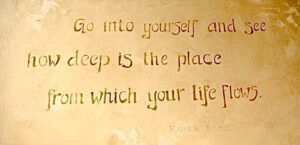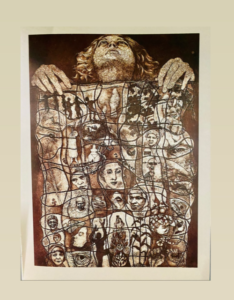Cathie Caccia
COVID Isolation: a contemplative frame.
December 22, 2020[Rilke]
I have, like so many, been in isolation since February…only daily hikes, the market, and virtual connection. Truly what has sustained me, even when I’ve bumped up along the edge, is a deep contemplative practice, the discipline of ‘stability loci’, a psychological function for withdrawal, surrender and acceptance: “This is my place, my situation, and that is what I want to work with, however it develops, for better or for worse.”
Deep gratitude for my virtual yoga teachers, Cathie Caccia and Seane Corn. Your spirit and guidance transcends the global sadness and dark, dark days ahead. jai
From the Center of Action & Contemplation:
Practice: Remaining in Place
What if the challenges of the current moment are actually offering us an invitation to let go of our ideas of freedom and mobility and to consciously participate with reality in a new way? In The Great Within psychologist Han F. de Wit invites us to consider the discipline of stabilitas loci (or remaining in place) as a liberating practice. He writes:
Many contemplative traditions contain the rule of not abandoning the monastic community or the place of retreat for shorter or longer periods (sometimes for life). If one follows this rule, it is almost always preceded by voluntarily taking a vow to keep to it. In the Christian tradition, it is known as the vow of stabilitas loci (remaining in one place). This place can, for example, be where one goes into the solitary retreat. The practitioner then vows not to leave this place before he has completed a specific spiritual practice or attained a certain realization. This approach can be found in the Hindu tradition: the yogi draws a certain line around her place of retreat and vows not to step outside it until she has completed a certain practice (sadhana), until she has reached enlightenment, or until death has reached her. A well-known example of this in the Buddhist tradition is obviously that of the Buddha himself, who finally sat down under the bodhi tree and vowed not to leave that spot until he had reached enlightenment. . . .
Why do people do this? What is the function of such a discipline? . . . The contemplative psychological function of this physical stabilitas and of the adherent vow is that we let go of the idea that we have an alternative, we give up the possibility of withdrawing. As we know, one of the characteristic aspects of ego is that it always wants to have alternatives available: ego reflects a mentality that always wants to keep an exit open and therefore can never come to complete surrender and acceptance. Through the vow of stabilitas loci, we confront and surrender an important part of that mentality. We say, “This is my place, my situation, and that is what I want to work with, however it develops, for better or for worse.”. . . The limitation that this discipline imposes on ego proves to have another element: a flourishing of self-confidence and strength of mind that enables us to be in the situation we are in without any reservations. What may seem claustrophobic or restrictive actually turns into vast and hospitable space. [1]
–Han F. de Wit
Fr. Richard Rohr:
Speaking from personal experience and my many years in Lenten hermitage (where I stayed in one small place for the forty days of Lent), I found a deep inner liberation in “giving up” my freedom to come and go as I chose. I am experiencing some of that same freedom in my hermit-like life necessitated by the pandemic. I cannot “fill” my life or myself up with outside experiences; I must simply “be” with myself and God.
Reference:
[1] Han F. de Wit, The Great Within: The Transformative Power and Psychology of the Spiritual Path (Shambhala Publications: 2019), 263–264.
“The anger made me brave and the grief made me sure.” The Book of Longings
Can not recommend this book more highly. Inhaling. -dayle
‘Lord God hear my prayer, the prayer of my heart.
Bless the largeness inside of me, no matter how I fear it.
Bless my reeds and my inks.
Bless the words I write.
May they be beautiful in your sight.
May they be visible to eyes not yet born.
When I am dust, sing these words over my bones:
She was a voice.’
‘I felt all the women who live inside of me.’
-The Book of Longings
Lakshmi & Kamala
November 17, 2020Lakshmi Yantra
A letter to Kamala Harris from Cathie Caccia in Sun Valley, Idaho, a revered yoga teacher, spiritual leader, and friend. A beautiful discovery, indeed. -dayle
Dear Kamala
I am a long time student and teacher of yoga. I was continuing to study Lakshmi this morning. You most likely know in the shortest summation Lakshmi is considered the goddess of spiritual and material wealth. Lakshmi is the goddess energy who preserves life. When we consider what it means to live sustainably in this world we are contemplating what it means to incarnate Lakshmi. With Lakshmi’s reappearance, love, generosity, sacred practices, wealth, and fertility return to the world. Another name for Lakshmi is Kamala (lotus-like). This really struck me today!!!! I am beyond grateful the Biden/Harris ticket won the election. There is so much work to be done to restore kindness, balance and right action and more. I am buoyed by the timeliness of Kamala rising. May you embody your name fully and help bring the potent, healing energy of Lakshmi to our country and globe.
Deep bow,
Cathie Caccia
Visit Cathie’s website for yoga instruction (virtual classes during COVID), Shiatsu massage, jewelry, and special events.
about Cathie…
Cathie Caccia began her yogic studies in 1984 and was immediately captivated by the physical, energetic and philosophical aspects of the practice. Her most influential teachers include Rodney Yee, Rod Stryker, Judith Lasater and more. Cathie has extensive training in Yoga, Yoga Therapy, Shiatsu, Acupressure and Massage and began teaching in 1987. Cathie’s classes combine her love of Yoga, Chinese energetics and Sanskrit chanting to support her students in accessing their most essential nature. Cathie is registered with Yoga Alliance as E-RYT 500, she teaches public and private classes, workshops and yoga teacher training. Cathie is a licensed massage therapist with over 1200 hours of training.
“In the spirit of Ha-tha, we must learn how to have one foot on the Sun, with our day-to-day business of living in the world, and one foot on the Moon, tending to the world of the psyche and the spirit.”—Bhavani Maki, The Yogi’s Roadmap
♡






